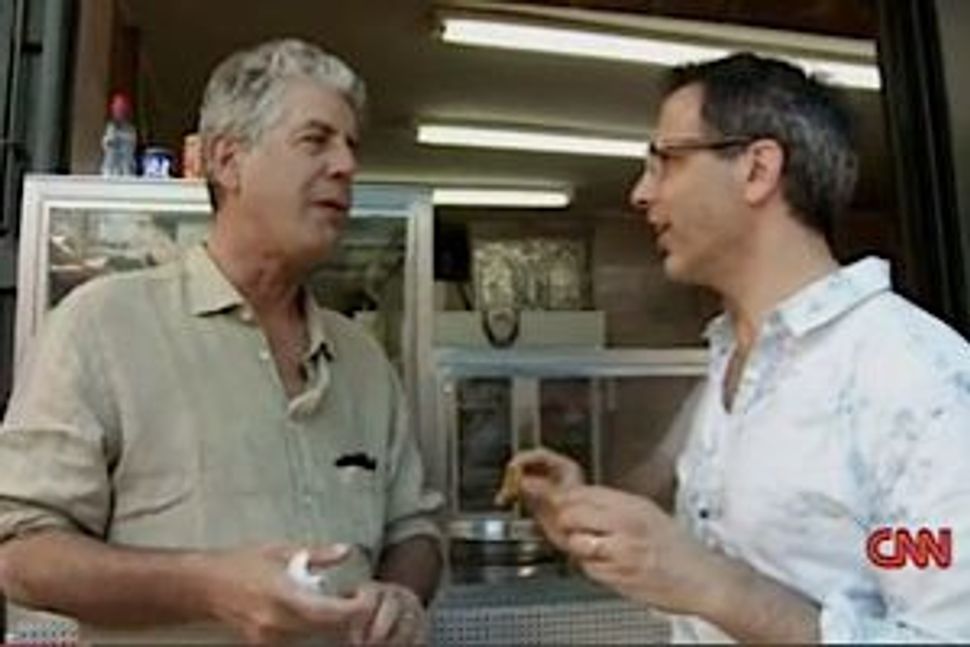What Anthony Bourdain Didn’t Eat in Israel

Anthony Bourdain, left, with Yotam Ottolenghi, in Jerusalem. Image by CNN
It took a decade and at least one petition circulated by fans, but celebrity chef Anthony Bourdain finally shot a show in Israel. “Jerusalem,” the first episode of “Parts Unknown, Season 2,” aired on CNN , giving viewers a chance to judge whether it was worth the wait.
First on “No Reservations” and now with “Parts Unknown,” Bourdain travels the world, looking to meet people and experience their food. In this episode Bourdain travels through Jerusalem, a few small Israeli towns, Jewish settlements and Palestinian parts of the West Bank as well as the Gaza Strip. He eats falafel just inside the Damascus Gate, in the Old City of Jerusalem, with the British-based Israeli chef Yotam Ottolenghi. He dines briefly at a home in the Jewish settlement of Ma’aleh Levona in the West Bank, hitches a ride with female Palestinian race car drivers, breezes through a cooking class in the Aida refugee camp, has a vegetarian meal at Jewish-Muslim couple Michal Baranes and Yakub Barhum’s restaurant Majda and spends time with “Gaza Kitchen” cookbook author Leila El-Haddad in Gaza.
Bourdain discusses his own Jewish identity (or lack thereof), asks his hosts direct questions about anti-Arab graffiti and street art glorifying terrorists and expresses hope for coexistence. He ends the episode in conversation with a restaurant owner in an Israeli town bordering the Gaza Strip who lost a daughter in a Hamas rocket attack.
“By the end of this hour I’ll be seen by many as a terrorist sympathizer, a Zionist tool, a self-hating Jew, an apologist for American imperialism, an Orientalist, a socialist, a fascist, a CIA agent and worse,” Bourdain says as the episode begins.
Read more and get Liz Steinberg’s recommendations at Haaretz.com.

I hope you appreciated this article. Before you go, I’d like to ask you to please support the Forward’s award-winning journalism this Passover.
In this age of misinformation, our work is needed like never before. We report on the news that matters most to American Jews, driven by truth, not ideology.
At a time when newsrooms are closing or cutting back, the Forward has removed its paywall. That means for the first time in our 126-year history, Forward journalism is free to everyone, everywhere. With an ongoing war, rising antisemitism, and a flood of disinformation that may affect the upcoming election, we believe that free and open access to Jewish journalism is imperative.
Readers like you make it all possible. Right now, we’re in the middle of our Passover Pledge Drive and we need 500 people to step up and make a gift to sustain our trustworthy, independent journalism.
Make a gift of any size and become a Forward member today. You’ll support our mission to tell the American Jewish story fully and fairly.
— Rachel Fishman Feddersen, Publisher and CEO
Join our mission to tell the Jewish story fully and fairly.
Our Goal: 500 gifts during our Passover Pledge Drive!
























